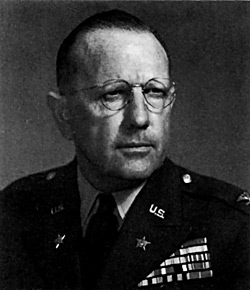Boris Pash (1900 – 1995) was a United States military intelligence officer who commanded the Alsos Mission during World War II.
Pash was called to active duty with the Army in 1940, and became chief of counter-intelligence at the Ninth Corps headquarters at the Presidio in San Francisco two years later. After the United States entered World War II in 1941, Pash was tasked with investigating security breaches at the Manhattan Project’s Berkeley Radiation Laboratory, where American officials suspected Soviet spies of stealing secret atomic research information.
Pash was soon summoned to Washington by Major General Leslie Groves, who placed him in charge of organizing and directing the Alsos Mission as a military-scientific force to investigate Nazi Germany’s atomic program. Pash was appointed military commander of Alsos, while Dr. Samuel A. Goudsmit was named chief of the unit’s scientific team.
Under Pash, the Alsos Mission carried out operations in Italy, France, and Germany. Members of the Alsos Mission were among the first American troops to enter Paris, seizing a sizeable cache of uranium and securing valauble information regarding the German atomic program.
In 1944, the Alsos task force began operations in Germany, which culminated in the capture of the German atomic research laboratory at Haigerloch, as well as other valuable targets in Hechingen, Bisingen, and Tailfingen.
In early May 1945, an operation led by Pash at Urfeld, Germany resulted in the capture of Werner Heisenberg, a leading German nuclear physicist who was quickly removed along with confiscated records to Heidelberg.





